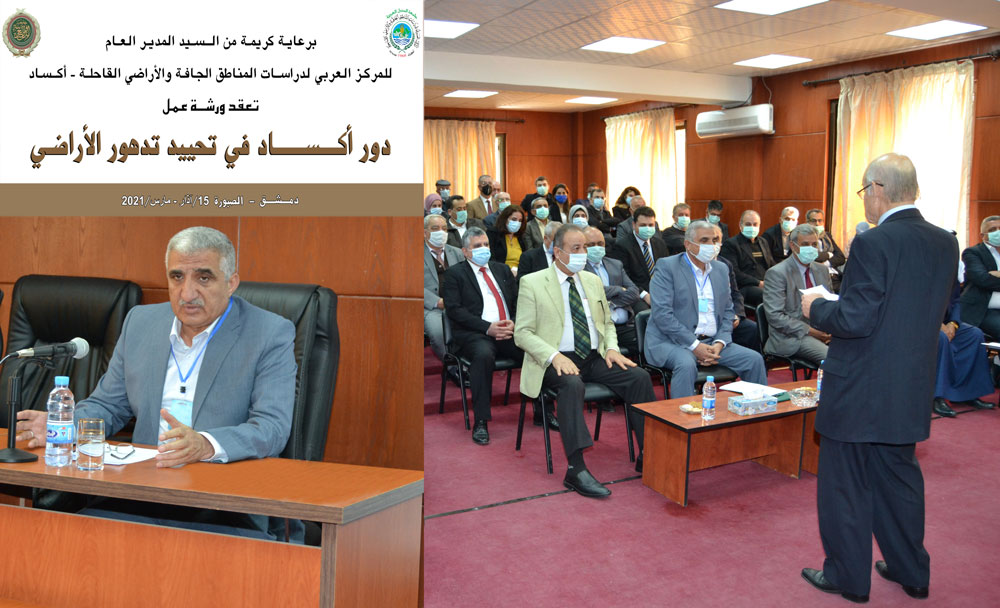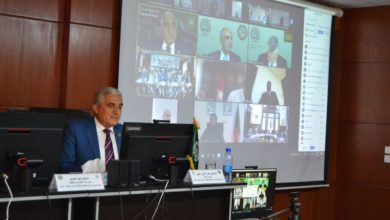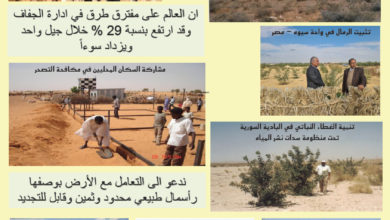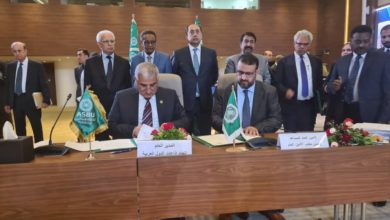ACSAD’s Role in Neutralizing land Degradation / Workshop
The Arab Center for the Studies of Arid Zones and Drylands ( ACSAD ) held today a workshop at the headquarters in Damascus on “the ACSAD Organization’s Role in Neutralizing land degradation ” under the title of ACSAD’s Contribution in Neutralizing Land Degradation, the index of change of the land cover, avoiding land degradation, desertification combat, restoring the degraded land, and the national program of land degradation neutrality in Syria; with the participation of 26 experts from the Syrian Arab Republic from the Ministries of Agriculture and Agrarian Reform, the Local Administration and Environment, Water Resources, General Organization of Remote Sensing, the Faculty of Agriculture in Damascus University, and the General Commission for Scientific Agricultural Research, and the two governorates Homs & Hamah.
In a speech at the opening of the workshop, His Excellency, the Director-General of the Arab Center( ACSAD), Dr. Nasr Edin Obaid, confirmed the importance of Arab cooperation and coordinating, the serious keenness of efforts integration to cope with the international community in reviewing the implementation of the combat desertification agreement, its strategic, and initiatives, especially the initiative of land degradation neutrality; knowing the results of the international governmental Panel on the Development of Effective Measures of implementations of the policies and methodologies of addressing drought, which affects most of the Arab countries located in the arid and semi-arid regions on Earth.
He also noted the importance of holding such a workshop to highlight the most important work carried out by ACSAD in this field and to keep pace with the global evolution in the implementation of the international initiative as it considered to be one of the most important global trends for the implementation of the fifteenth goal of sustainable development, which adopted combating desertification, restoring degraded land and reversing it back to return to its previous era of production.
He stressed the importance of efforts coordinating, unifying attitudes in dealing with desertification issues and land degradation, following up the process of land degradation neutrality. He confirmed that was concord with ACSAD’s tasks in the Arab region on conserving the ecosystems, caring for the land resources and developing them, rationalizing its investment to go on with production, and secure humans needs of life.
Dr. Obaid also concentrated on the importance of work on the land degradation neutrality initiative and ACSAD’s role in implementing it at the level of the Arab world in general and in the Syrian Arab Republic in particular; pointing out that neutralizing land degradation was one of the important things that should be regarded when dealing with the issues of desertification.
His Excellency the Director-General presented an extensive presentation for some events and activities carried out by ACSAD Organization in the field of combat desertification, land degradation neutrality in the Syrian Arab Republic, like monitoring desertification for the distant of million hectares in AL-Bashri region and restoring about 5000 hectares from the same region, combating sand drift, developing pastures for 2000 hectares in Harbeesheh and Kabajeb in AL-Badia region, survey the natural resources for 3.5 million hectares in the Syrian desert (AL- Badia).
He pointed out some examples in the Arab countries, such as the annual monitoring for the vegetation change by using the remote sensing technologies for the whole land of the Arab world, combating desertification for 2000 hectares in Sabha and AL-Surra in the Jordanian Badia, 6000 hectares in Eygpt distributed on Siwa oasis, Matrouh, and Sinai, 4000 hectares in the Algerian steppe and 2000 hectares at AL-Amaria region in Saudi Arabia. Also, the preparation of land degradation maps for the whole Yemani lands and preparing such those maps for 100 million hectares in the Republic of Sudan. He also noted that all the combating desertification projects implemented by ACSAD had positive reflections on humans and the environment.
Dr. Nasr Edin Obaid added that ACSAD had culminated its activities by expanding the spread of conservation agriculture systems in the Arab region. It applied that system in Syria in collaborating with the Ministry of Agriculture and Agrarian Reform. The beginning was in 2007/2008 on 30 hectares owned by 25 farmers to amount at the end of 2018 to 12000 hectares for more than 1200 farmers. Then, it amounted to 30000 hectares in 2018. The circle of work expanded to contain Lebanon, Jordan, Mauritania, Sudan, Egypt, Tunisia, Algeria, and Iraq. The area under cultivation amounted to more than 200000 hectares on the Arab world level.
He clarified that the results showed that the Conservation Agriculture System’s application led to improving the productivity of all crops cultivated cereals and legumes, increasing rainwater use, and reducing the agricultural production costs. This work constituted a qualitative leap in Neutralizing land degradation.
He also emphasized that the land resources formed a fundamental axis to improving the food security of the Arab world, whereas the demand for food was expected to increase by 70% by the year 2050. He added that this situation would impose growing competition for the land resources, which would face developmental challenges, the most important of which was the substantial challenge to increase its contribution to food production and addressing the expected effects of drought and climate change.
At the end of his speech, His Excellency, the Director-General of the ACSAD Organization, Dr. Nasr Edin Obaid, called for the preservation of land resources from degradation, increasing its productivity to providing more food for Arab people, and working on neutralizing land degradation to access the desirable goal.




